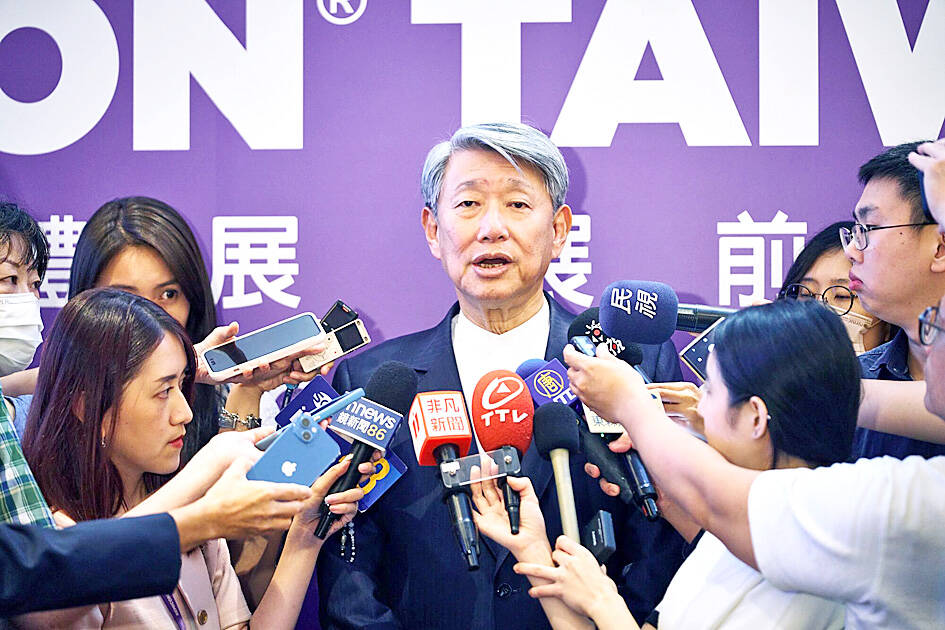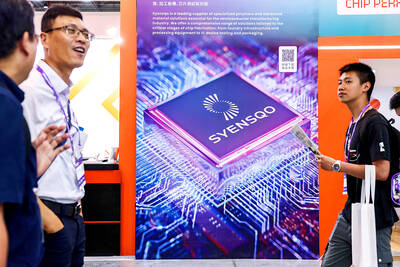Minister of Economic Affairs J.W. Kuo (郭智輝) yesterday said Taiwan’s government plans to set up a business service company in Kyushu, Japan, to help Taiwanese companies operating there.
“The company will follow the one-stop service model similar to the science parks we have in Taiwan,” Kuo said. “As each prefecture is providing different conditions, we will establish a new company providing services and helping Taiwanese companies swiftly settle in Japan.”
Kuo did not specify the exact location of the planned company but said it would not be in Kumamoto, the Kyushu prefecture in which Taiwan Semiconductor Manufacturing Company (TSMC, 台積電) has a fab and is preparing to build another one.

Photo: An Rong Xu, Bloomberg
Different prefectures in Kyushu are offering different incentives for foreign companies, "so the service company we set up will help organize the information and facilitate the 'localization' of Taiwanese enterprises," Kuo said.
Nagasaki, Oita, Miyazaki, and Kitakyushu are some of the Kyushu prefectures that have expressed interest in welcoming Taiwanese companies, he said.
Currently, the plan is limited to Kyushu, he said in response to a question on whether other Taiwanese one-stop service centers will be set up in Japan in the future.
Photo: Grace Hung, Taipei Times
"For other areas such as Kansai and Kanto, it would depend on the nature of the local industries, as most of the Taiwanese companies currently in Japan are part of the supply chain [for the semiconductor industry]," Kuo said.
Asked about a report that TSMC was planning to build a third fab in Japan, Kuo said that question should be directed to the company.
A Japanese media outlet on Sunday quoted Kuo as saying that TSMC would build a third fab in Japan to produce leading-edge chips after 2030.
Kuo, who was doorstepped by reporters ahead of a news conference for this week’s Semicon Taiwan exhibition, also pushed back at criticism of Taiwan by US Republican presidential nominee and former president Donald Trump, and denied that Taiwan took the US chip industry.
“Of course Taiwan is not stealing the chip industry from the US,” Kuo told reporters in Taipei. “The chips we made are commissioned by US companies, which still have the highest gross margin. Trump might have some misunderstanding on such matters, and we will clarify that.”
Trump rattled Taiwan officials and the country’s markets with comments published on July 16 in Bloomberg Businessweek that criticized Taiwan over its chip sector and urged it to pay the US for protection.
That has raised fears that if Trump succeeds US President Joe Biden, who has repeatedly said the US would defend Taiwan from a Chinese attack, he would be less committed, viewing Taiwan in transactional terms.
“Taiwan took our chip business from us,” Trump said at the time. “I mean, how stupid are we? They took all of our chip business. They’re immensely wealthy.”
Since Trump’s comments, Taiwanese officials have tried to talk up the nation’s efforts to uphold its part of the relationship.
In response to Trump’s call for Taiwan to “pay” the US for protection, Premier Cho Jung-tai (卓榮泰) said the country has increased defense spending and extended the conscription period.
“It’s our shared responsibility and goal to maintain the peace and stability in the Taiwan Strait and the Indo-Pacific region,” Cho said on July 17.

SEMICONDUCTOR SERVICES: A company executive said that Taiwanese firms must think about how to participate in global supply chains and lift their competitiveness Taiwan Semiconductor Manufacturing Co (TSMC, 台積電) yesterday said it expects to launch its first multifunctional service center in Pingtung County in the middle of 2027, in a bid to foster a resilient high-tech facility construction ecosystem. TSMC broached the idea of creating a center two or three years ago when it started building new manufacturing capacity in the US and Japan, the company said. The center, dubbed an “ecosystem park,” would assist local manufacturing facility construction partners to upgrade their capabilities and secure more deals from other global chipmakers such as Intel Corp, Micron Technology Inc and Infineon Technologies AG, TSMC said. It

People walk past advertising for a Syensqo chip at the Semicon Taiwan exhibition in Taipei yesterday.

NO BREAKTHROUGH? More substantial ‘deliverables,’ such as tariff reductions, would likely be saved for a meeting between Trump and Xi later this year, a trade expert said China launched two probes targeting the US semiconductor sector on Saturday ahead of talks between the two nations in Spain this week on trade, national security and the ownership of social media platform TikTok. China’s Ministry of Commerce announced an anti-dumping investigation into certain analog integrated circuits (ICs) imported from the US. The investigation is to target some commodity interface ICs and gate driver ICs, which are commonly made by US companies such as Texas Instruments Inc and ON Semiconductor Corp. The ministry also announced an anti-discrimination probe into US measures against China’s chip sector. US measures such as export curbs and tariffs

The US on Friday penalized two Chinese firms that acquired US chipmaking equipment for China’s top chipmaker, Semiconductor Manufacturing International Corp (SMIC, 中芯國際), including them among 32 entities that were added to the US Department of Commerce’s restricted trade list, a US government posting showed. Twenty-three of the 32 are in China. GMC Semiconductor Technology (Wuxi) Co (吉姆西半導體科技) and Jicun Semiconductor Technology (Shanghai) Co (吉存半導體科技) were placed on the list, formally known as the Entity List, for acquiring equipment for SMIC Northern Integrated Circuit Manufacturing (Beijing) Corp (中芯北方積體電路) and Semiconductor Manufacturing International (Beijing) Corp (中芯北京), the US Federal Register posting said. The